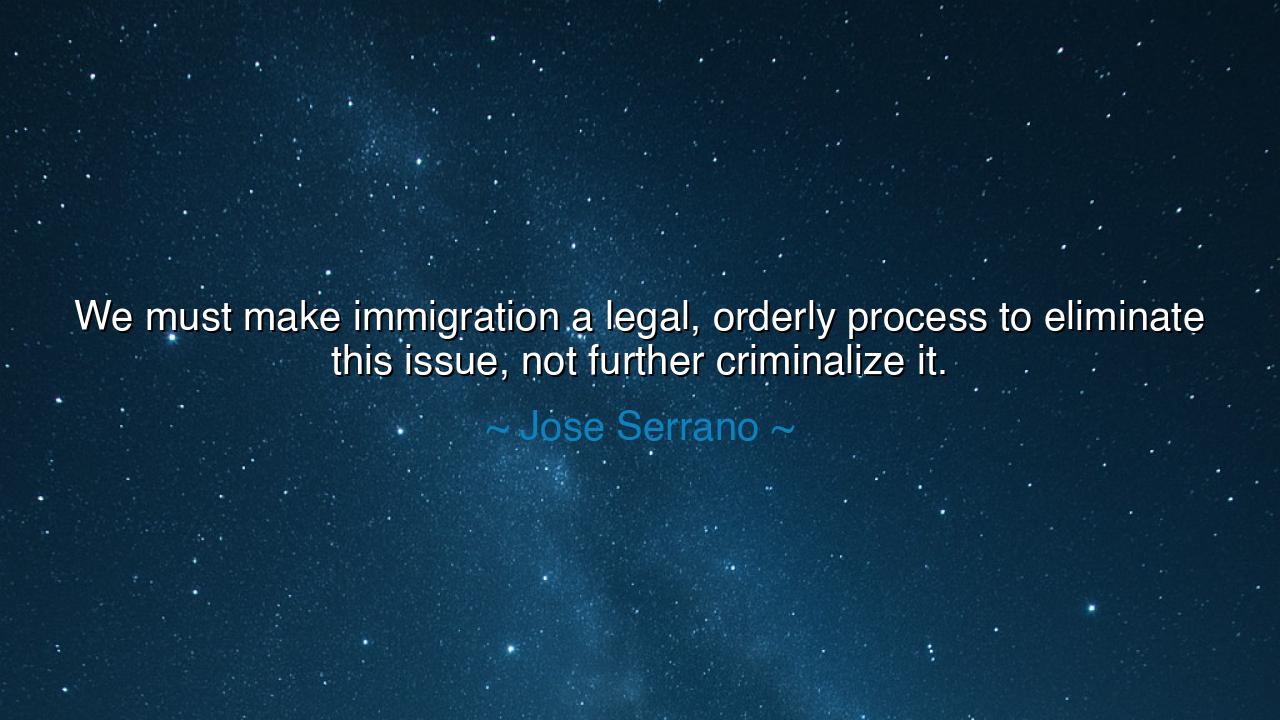
We must make immigration a legal, orderly process to eliminate
We must make immigration a legal, orderly process to eliminate this issue, not further criminalize it.






When Jose Serrano proclaimed, “We must make immigration a legal, orderly process to eliminate this issue, not further criminalize it,” he spoke not merely as a politician, but as a man of conscience — one who saw in the plight of immigrants a reflection of humanity’s timeless struggle for belonging. His words rise with both compassion and clarity, echoing a wisdom that transcends his era: that the law should be a pathway to justice, not a weapon of division; that order should serve mercy, not cruelty. In his vision, the solution to chaos was not punishment, but structure — a system where immigration would be guided by fairness, rather than stained by fear.
The origin of this quote lies in the long and often bitter debate over immigration in the United States, particularly in the early 2000s, when arguments about border control, labor, and citizenship stirred deep passions. Jose E. Serrano, a congressman from New York and a proud son of Puerto Rican heritage, spoke from experience and empathy. He understood the immigrant not as a stranger, but as a worker, a dreamer, and a parent seeking a better life. To him, the true disorder lay not in the movement of people, but in the brokenness of the system meant to guide them. His call for a “legal, orderly process” was not an invitation to leniency, but a plea for wisdom — for laws rooted in reality and compassion, rather than in fear and political posturing.
His statement carries an ancient resonance, for every civilization has faced this same test. In the days of Rome, as its empire expanded, peoples from every corner of the known world flooded its cities — soldiers, artisans, slaves, and merchants alike. Some Roman leaders sought to integrate them, granting citizenship to those who served and contributed; others feared them, calling for exclusion and control. The fate of Rome itself depended on how it treated the outsider, for as history shows, an empire that forgets its humanity soon loses its soul. Serrano’s words are a modern echo of this timeless truth — that strength does not come from rejection, but from wise inclusion guided by law.
To criminalize the immigrant, Serrano warned, was to mistake symptom for cause. People do not abandon their homes and families for pleasure, but from necessity — driven by hunger, danger, or hope. To respond to that desperation with punishment is to harden the heart of a nation. True order, he insisted, is not built by prisons or walls, but by justice and clarity. When laws are fair and accessible, people follow them; when they are impossible and cruel, they invite defiance. Thus, Serrano’s vision was not one of weakness, but of strength — the strength that comes from law shaped by understanding, not vengeance.
There is a living parable in the story of Moses and the Exodus. When the Israelites fled Egypt, they crossed borders as refugees, seeking only freedom and survival. Pharaoh’s response was to criminalize their flight, to see in their movement not the cry of the oppressed, but a threat to his order. And so he hardened his heart — and lost his kingdom. Serrano’s words carry the same moral weight: that the law must serve the living, not oppress them; that order must be rooted in compassion, or it becomes tyranny. To make immigration “legal and orderly” is not to erase boundaries, but to make them humane — to craft a system that upholds both sovereignty and dignity.
His message also reflects a profound understanding of balance — the eternal dance between mercy and justice. The state must uphold its borders, but it must also uphold its soul. For a law that forgets compassion becomes lifeless; a society that forgets justice becomes divided. Serrano’s vision seeks the middle path, the same path the ancients called the golden mean: where structure and mercy walk together, each tempering the other. In this, his words are not merely political — they are moral instruction for any people who would claim to be civilized.
Let this be the lesson passed to future generations: that to fix the world’s chaos, we must first fix the systems that govern it — and to fix those systems, we must begin with the heart. Do not answer desperation with punishment, nor treat the seeker as a criminal. Build laws that are fair, processes that are clear, and policies that recognize the humanity of all. For the measure of a nation is not how it treats its powerful, but how it treats those who come to its gates in need.
And so, Jose Serrano’s words endure as a timeless commandment: make justice orderly, and compassion lawful. For when a nation builds laws that reflect both reason and mercy, it not only protects its borders — it preserves its soul.






AAdministratorAdministrator
Welcome, honored guests. Please leave a comment, we will respond soon